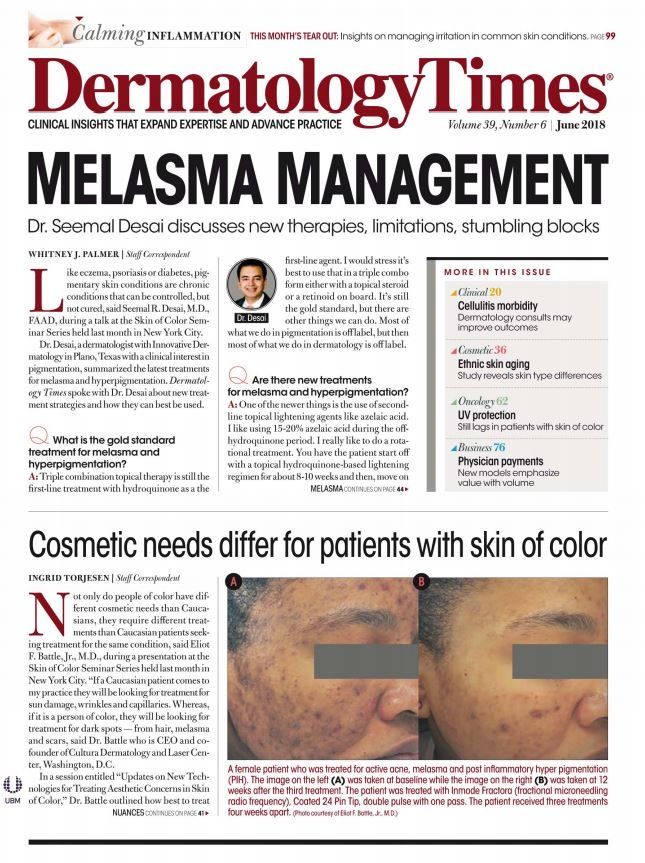- Case-Based Roundtable
- General Dermatology
- Eczema
- Chronic Hand Eczema
- Alopecia
- Aesthetics
- Vitiligo
- COVID-19
- Actinic Keratosis
- Precision Medicine and Biologics
- Rare Disease
- Wound Care
- Rosacea
- Psoriasis
- Psoriatic Arthritis
- Atopic Dermatitis
- Melasma
- NP and PA
- Skin Cancer
- Hidradenitis Suppurativa
- Drug Watch
- Pigmentary Disorders
- Acne
- Pediatric Dermatology
- Practice Management
- Prurigo Nodularis
- Buy-and-Bill
Publication
Article
Dermatology Times
Herpes zoster rates stay steady with biologics in psoriasis
Author(s):
Study shows no significant difference in herpes zoster risk between psoriasis patients receiving systemic therapy and those not receiving systemic therapy.
Among patients with moderate-to-severe psoriasis receiving systemic treatment, risk of herpes zoster was not significantly different between patients treated with biologics vs those not treated with biologics, according to results of a large cohort study published in JAMA Dermatology.
There was also no significant difference in herpes zoster risk between those patients receiving systemic therapy and those receiving no systemic therapy.
“Our results suggest that among systemically treated psoriasis patients, biologics may preferentially inhibit immune mechanisms specific for bacterial defense while sparing cell-mediated immune responses specific for maintaining varicella zoster virus (VZV) latency,” wrote the researchers, who included Katherine A. Levandoski, BS, Charles P. Quesenberry, PhD, Ai-Lin Tsai, MA, and Maryam M. Asgari, MD, MPH.
The latent varicella zoster virus causes herpes zoster, with risk increasing as cell-mediated immunity wanes secondary to immunosuppression and advancing age.
To date, there are few data available on the risk of herpes zoster among psoriasis patients receiving biologics, and results of previous studies are conflicting as to whether such agents could increase risk, researchers wrote.
To determine how systemic agents - biologics in particular - might impact herpes zoster incidence rates, Dr. Levandoski and colleagues studied adult health plan members with psoriasis diagnosed between 1998 and 2011 at Kaiser Permanente Northern California (KPNC), an integrated health care delivery system with more than 4 million members.
Participants were followed through December 2012 for incident herpes zoster - which was defined by specific provider-rendered ICD-9 diagnosis codes. Among 5,889 participants who had systemically treated psoriasis, 291 received a herpes zoster diagnosis during a mean follow-up of 5.3 person years.
Overall, there was an increase in herpes zoster risk, albeit not a significant risk, with crude incidence rates of 8.6 (95% CI, 7.1-10.0) for those on no systemic therapy and 10.2 (95% CI, 8.6-11.8) for those on systemic therapy, data show.
After adjusting for age and sex, there were no significant differences between groups, with an adjusted IR of 6.1 (95% CI, 4.1-8.1) for no systemic therapy, versus 8.1 (95% CI, 5.3-11.0) for any systemic therapy, investigators reported. Likewise, IRs were not significantly different for biologics only (7.8; 95% CI, 4.1-11.5) versus nonbiologics only (8.9; 95% CI, 4.1-13.6).
“Crude point estimates did not suggest an increased herpes zoster risk in systemically treated patients with psoriasis, and we found no significant differences in herpes zoster risk among those exposed to biologic vs nonbiologic therapy after adjusting for age and sex,” investigators wrote.
While these results are limited due to lack of data on disease severity, among other factors, investigators said they are similar to data from another recently published retrospective cohort study by Shalom and colleagues in which there was no significant association between single-agent biologics and adjusted herpes zoster risk in patients with psoriasis.
In that study, based on 500,000 person-years from the administrative database of the largest public health care provider organization in Israel, multivariate analysis found no association between treatment with biologics, cyclosporine, methotrexate, or phototherapy and herpes zoster risk.
By contrast, the combination of biologics and methotrexate was significantly associated with an increased herpes zoster incidence, leading Shalom and colleagues to suggest in their report that physicians might want to consider offering preventive vaccine to some patients receiving combination treatment.
SUMMARY
To date, there have been limited data on the risk for herpes zoster in patients with psoriasis treated with biologic medications or other systemic treatments.
This study shows no significant differences in risk of herpes zoster for patients treated with biologics versus those treated with other systemic therapies.
The findings appear to corroborate an earlier report showing no association between single-agent biologic treatment and herpes zoster risk.
DISCLOSURES
Study authors received research funding from Pfizer Inc and Valeant Pharmaceuticals. This study was supported in part by grants from the National Institutes of Health and Pfizer Inc., which had no role in any aspect of study design, conduct, analysis, or manuscript development.
REFERENCES
1. Levandoski KA, Quesenberry CP, Tsai A-L, Asgari MM. "Herpes Zoster Rates in a Large Cohort of Patients With Systemically Treated Psoriasis," JAMA Dermatololgy. Dec. 20, 2017. DOI:10.1001/jamadermatol.2017.4840.
2. Shalom G, Zisman D, Bitterman H, et al. "Systemic therapy for psoriasis and the risk of herpes zoster: a 500,000 person-year study," JAMA Dermatology. 2015; 151(5):533-538. doi:10.1001/jamadermatol.2014.4956.







